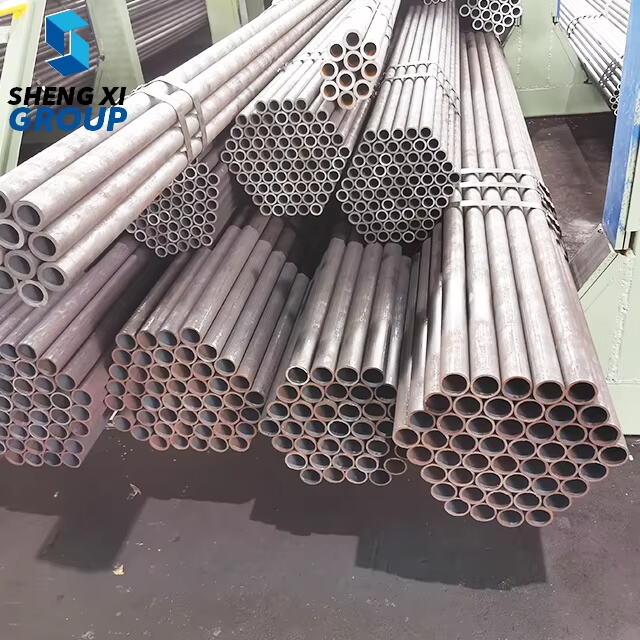Understanding Special Steel Fundamentals
Special steel stands out in industries where strength and lasting power matter most. What makes it different from regular steel? Well, manufacturers design special steel for particular jobs, giving it qualities that regular steel just can't match. Think about things like extra strength when heated or protection against rust and wear. The construction industry relies on it heavily, but aerospace engineers love it too for parts that need to withstand incredible stress during flight. Automotive manufacturers use special alloys for engine components that face extreme temperatures day after day. There are many kinds of special steel out there, from tool steels that last through countless production cycles to surgical grade stainless steels found in hospital equipment. When companies understand what each type does best, they can solve tough problems while keeping workers safe and reducing waste over time. That's why so many forward thinking businesses invest in learning about these materials first hand.
Major Types of Special Steel
Carbon Steel Variants: Low to High Grades
Carbon steel comes in various grades, each differentiated by its carbon content: low, medium, and high carbon steels.
Low Carbon Steel: Known as mild steel, contains less than 0.3% carbon. It's highly ductile and weldable, making it popular for applications like pipes, wires, and general hardware.
Medium Carbon Steel: With a carbon content between 0.31% and 0.6%, this variant offers higher strength and hardness, although it sacrifices some ductility and weldability. Typical uses include railroad applications and mechanical parts.
High Carbon Steel: Contains 0.61% to 1% carbon, offering even more strength and hardness, but at the cost of brittleness. It's used for high-strength applications such as springs and cutting tools.
The carbon content directly impacts the steel's properties, enhancing hardness and strength but reducing weldability and toughness. This variance plays a vital role across industries, from construction to machinery manufacturing, where the specific demands for steel's performance must be met.
Alloy Steels: Enhanced Performance Properties
Alloy steels are defined by the addition of elements like chromium, nickel, and molybdenum, enhancing their mechanical properties significantly.
Chromium and Molybdenum Alloy: Known as chromoly, this steel variant provides excellent fatigue resistance and corrosion resistance, highly valued in aerospace applications due to its high specific strength.
Nickel-Chromium-Molybdenum Alloy: Exemplified by the steel type 4340, it's favored for its high strength and toughness, making it suitable for demanding applications like automotive gears and crankshafts.
Chromium-Vanadium Alloy: Like the steel type 6150, praised for its toughness and shock resistance, supporting applications requiring durability under stress.
Alloy steels contain varying proportions of additional elements, often ranging from 1% to over 50%, depending on the enhancement needed. These properties make alloy steels indispensable across industries for components that demand improved toughness, wear resistance, and strength, including in automotive, military, and structural applications.
Tool and Stainless Steel Varieties
Tool Steel Classifications and Uses
Tool steels are essential materials known for their hardness and wear resistance, tailored to various demanding applications in manual and automated manufacturing. They are classified into distinct categories:
High-Speed Steel (HSS): This tool steel retains its properties at high temperatures and is often used for cutting tools like drill bits and saw blades due to its durability during machining operations.
Cold Work Tool Steel: Suitable for operations carried out below 200°C, this type offers excellent impact resistance and is ideal for shear blades and stamping tools.
Hot Work Tool Steel: Designed for applications above 200°C, such as die casting and forging, it excels in maintaining mechanical properties at elevated temperatures.
These classifications highlight tool steel's pivotal role in various industrial applications, fundamentally enhancing processes like machining and die manufacturing by providing the necessary hardness and temperature stability.
Stainless Steel Subtypes and Features
Stainless steel is renowned for its corrosion resistance and is categorized into several subtypes based on their microstructure and composition:
Austenitic Stainless Steel: With high chromium and nickel content, this subtype is non-magnetic and offers excellent corrosion resistance. It's commonly found in food processing equipment and architectural applications.
Ferritic Stainless Steel: Known for its ductility and cost-effectiveness, ferritic steel is magnetic and is frequently used in industrial equipment.
Martensitic Stainless Steel: This type is hard and strong, suitable for crafting cutlery and surgical instruments, though it is less resistant to corrosion.
Duplex Stainless Steel: Combining features of both ferritic and austenitic types, duplex steel provides high tensile strength and is used in marine and chemical industries.
These subtypes leverage stainless steel's durability under various environmental conditions, making it indispensable across diverse sectors, from medical to aerospace applications. Its robust resistance to rust extends its utility into fields demanding long-term resilience and quality sustainability.
Key Special Steel Applications
Construction and Infrastructure Projects
Special steel is pretty much essential for building things like roads, bridges, and buildings across the construction industry. We see it used everywhere from support beams to reinforcing bars (rebar) and even those ready-made concrete parts they install on site. What makes this type of steel stand out? Well, it just plain holds up better under tough conditions. The stuff is super strong and doesn't crack easily when exposed to weather changes or heavy loads over time. That's why engineers keep coming back to it whenever they need something reliable for load-bearing structures where failure isn't an option.
Noteworthy case studies illustrate the transformative impact of special steel in large-scale construction projects, with a demand surge in industrialized construction methods increasing opportunities for the steel industry. This offers considerable benefits, with steel being an essential component in building sustainable and resilient infrastructure.
Automotive and Aerospace Manufacturing
Special steel is fundamental to the automotive and aerospace sectors, which demand materials that combine strength and lightweight properties. In automotive manufacturing, components such as gears and shafts must exhibit small and high-strength features, while airframe structures in aerospace require meticulously designed elements to ensure aerodynamic efficiency and safety.
The strength-to-weight ratio of special steel components provides significant performance advantages and supports the creation of cutting-edge designs. Its role in advancing these industries is crucial, enabling innovations and efficiency that ultimately drive economic growth and technological development.
Industrial Applications of Special Steel
Oil, Gas and Petrochemical Equipment
In the oil and gas industry, special steel plays a vital role because it resists corrosion and handles extreme heat without failing. Equipment made from this type of steel needs to survive brutal conditions found on offshore platforms, underground pipelines running hundreds of miles, and inside refineries where temperatures can reach dangerous levels. For all these reasons, the steel specifications in these sectors aren't just recommendations they're strict rules set by international standards organizations. Meeting these standards isn't optional when lives depend on reliable infrastructure that lasts through decades of operation under constant stress.
Pipelines made from special steel demonstrate its indispensability, with reduced maintenance costs and enhanced operational efficiency being key factors in the petrochemical industry.
Energy Sector and Machinery Components
Special steel plays a critical role in energy-related machinery like turbines and generators, enhancing efficiency and sustainability. The material's durability and strength aid in minimizing wear and tear, which translates to longer service life and reduced maintenance costs.
Using special steel components leads to decreased downtime and improved energy conversion rates, bolstering the practicality of special steel in a sustainable energy landscape. Implementing special steel in turbines and generators can reduce energy loss and increase overall efficiency, aligning with global sustainability goals.

Selection Criteria for Special Steel
Material Properties and Performance Needs
When selecting specialty steel, it's important to know about key material characteristics like tensile strength, yield strength, and how stretchy or flexible it is. These factors really determine how well the steel will perform when put to work. Take aerospace components for example they need super strong tensile strength so they don't fail when subjected to extreme forces during flight. On the flip side, materials with good ductility are what allow manufacturers to bend and shape steel into intricate parts without it snapping apart. The right balance between these properties makes all the difference in creating reliable products across different industries.
Real-world examples underscore the importance of matching material properties with specific application needs, emphasizing the necessity of selecting steel types tailored to performance requirements.
Cost-Effectiveness in Project Planning
Assessing the cost-effectiveness of special steel is a vital component of project planning, directly influencing timelines and budgets. Special steels offer substantial long-term savings through their durability and performance longevity.
A thorough cost-benefit analysis of materials is essential for optimizing project outcomes, ensuring value through reduced downtimes and enhanced efficiency.
FAQ Section
What distinguishes special steel from standard steel?
Special steel is tailored for specific applications, offering enhanced properties like strength, heat resistance, and corrosion resistance, unlike standard steel.
Why is special steel crucial in the construction industry?
Special steel provides strength and durability in construction, making it essential for critical structural components to ensure safety and longevity.
How does special steel contribute to the aerospace sector?
Its strength-to-weight ratio and resistance to extreme conditions make special steel invaluable in aerospace applications, supporting reliable and efficient designs.
How do material properties influence the selection of special steel?
Tensile strength, yield strength, and ductility are crucial properties that determine the steelâs performance in specific applications.
What are the benefits of using special steel in the energy sector?
Special steel's durability and strength enhance machinery efficiency, reduce maintenance costs, and support sustainability goals.
Table of Contents
- Understanding Special Steel Fundamentals
- Major Types of Special Steel
- Tool and Stainless Steel Varieties
- Key Special Steel Applications
- Industrial Applications of Special Steel
- Selection Criteria for Special Steel
-
FAQ Section
- What distinguishes special steel from standard steel?
- Why is special steel crucial in the construction industry?
- How does special steel contribute to the aerospace sector?
- How do material properties influence the selection of special steel?
- What are the benefits of using special steel in the energy sector?


